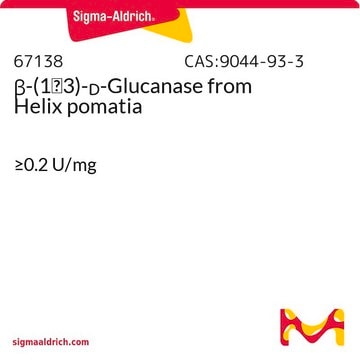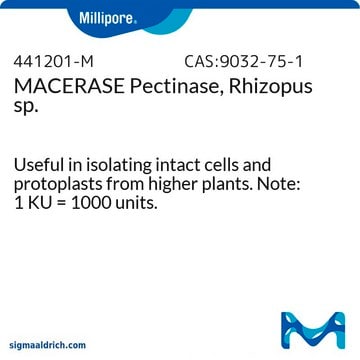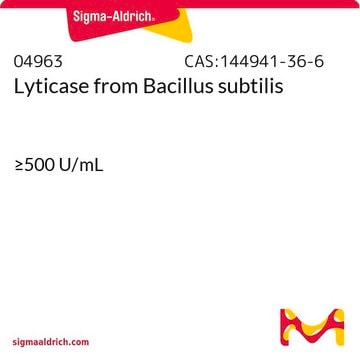L3768
Lysing Enzymes from Aspergillus sp.
powder
Synonyme(s) :
Cellulase, Lysing Enzymes, Pectinase
Se connecterpour consulter vos tarifs contractuels et ceux de votre entreprise/organisme
About This Item
Code UNSPSC :
12352204
Nomenclature NACRES :
NA.54
Produits recommandés
Source biologique
Aspergillus niger
Forme
powder
Technique(s)
cell based assay: suitable
Couleur
brown
Adéquation
suitable for cell lysis
Application(s)
cell analysis
Température de stockage
2-8°C
Description générale
Lysing enzymes are also known as lytic enzymes or cell wall lytic enzymes.
Application
Lysing Enzymes from Aspergillus sp. has been used to digest the cell walls to create pulse-field gel plugs.
Lysing Enzymes from Aspergillus sp. has been used:
- to digest the cell wall of Schizosaccharomyces pombe
- to lyse the mycelium cell wall of Trichoderma harzianum
Actions biochimiques/physiologiques
Lysing enzymes are a group of enzymes that can break down the cell walls of microorganisms. These enzymes play a crucial role in various biological processes, including cell lysis, tissue dissociation, and protein extraction. Lysing enzymes are commonly used in research, biotechnology, and clinical applications. They are especially useful in DNA extraction, where they help to release genetic material from cells by breaking down the cell walls. This enables efficient isolation and purification of DNA for downstream analyses. Cellulases are a class of enzymes that degrade cellulose, a major component of plant cell walls, into simpler sugars. These sugars can be utilized as raw materials to produce biofuels, biobased chemicals, plastics, and various other materials. Pectinases are a group of enzymes that hydrolyze pectic substances found in microorganisms and higher plants. They can break down the pectin-containing compounds synthesized by plants and microbes.
Qualité
Contains pectinase and cellulase activities.
Code de la classe de stockage
11 - Combustible Solids
Classe de danger pour l'eau (WGK)
WGK 3
Point d'éclair (°F)
Not applicable
Point d'éclair (°C)
Not applicable
Certificats d'analyse (COA)
Recherchez un Certificats d'analyse (COA) en saisissant le numéro de lot du produit. Les numéros de lot figurent sur l'étiquette du produit après les mots "Lot" ou "Batch".
Déjà en possession de ce produit ?
Retrouvez la documentation relative aux produits que vous avez récemment achetés dans la Bibliothèque de documents.
Les clients ont également consulté
Tara L Mastro et al.
Journal of cell science, 133(10) (2020-04-23)
Translesion synthesis polymerases (TLSPs) are non-essential error-prone enzymes that ensure cell survival by facilitating DNA replication in the presence of DNA damage. In addition to their role in bypassing lesions, TLSPs have been implicated in meiotic double-strand break repair in
Pectinase from Microorganisms and Its Industrial Applications
Haile S and Ayele A
TheScientificWorldJournal (2022)
Translesion synthesis polymerases contribute to meiotic chromosome segregation and cohesin dynamics in Schizosaccharomycespombe
Mastro TL, et al.
Journal of Cell Science (2020)
Unleashing the Promise of Biotechnology to Help Heal, Fuel, and Feed the World
Greenwood JC
Journal of biological and chemical chronicles (2014)
New strains obtained after UV treatment and protoplast fusion of native Trichoderma harzianum: their biocontrol activity on Pyrenochaeta lycopersici
Besoain X A, et al.
Electronic journal of Biotechnology, 10(4), 604-617 (2007)
Notre équipe de scientifiques dispose d'une expérience dans tous les secteurs de la recherche, notamment en sciences de la vie, science des matériaux, synthèse chimique, chromatographie, analyse et dans de nombreux autres domaines..
Contacter notre Service technique









